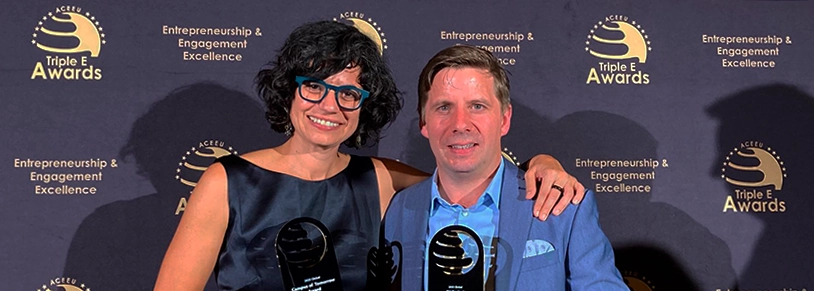The “Digital Academy in Teaching Practice for a Seamless Transition from Pre-Service to In-Service” project led by the Universidad Europea del Atlántico (European University of the Atlantic), (UNEATLANTICO) with the participation of FUNIBER together with other European institutions, received the third prize for Project of the Year from the European Union, as judged by an international jury, and first place in social media voting at the prestigious ACEEU Triple E Awards, at a ceremony held in Prague, Czech Republic, on September 12.
The Universidade Internacional do Cuanza (UNIC), which is a member of the FUNIBER network of universities, also received an award in the Campus of the Future category.
The project ceremony, held at Prague Castle, was attended by Dr. Thomas Prola, co-leader of the DigitalTA project, and Dr. Carmen Lilí Rodríguez, Vice Rector of Academic Affairs of UNIC.
The DigitalTA project ended in June 2025 but will continue its work with the launch of the Teacher Welfare Program, which will begin in October 2025, coinciding with the International Teachers’ Day. The project arises from the collaboration agreement between the Universidad Europea del Atlántico and the Social Action area of the Iberoamerican University Foundation (FUNIBER), as well as the partners of the Digital Teacher Academy project, and will last for three years. It is a comprehensive approach focused on professional care to increase teacher well-being and reduce teacher attrition.
The awards ceremony was held as part of the forum: “Excellence in Higher Education in the 21st Century: Cultivating Synergies between Purpose, Strategy, and Culture to Drive Entrepreneurship, Innovation, and Impact”. With welcoming remarks from Prof. Dr. Thorsten Kliewe, president of ACEEU, and Prof. Dr. Michal Lošťák, professor at the Czech University of Life Sciences, two days of exchange on entrepreneurship, commitment, and social impact began, attended by 100 people from all continents, including academics, professionals, students, and entrepreneurs.
The conference focused on exploring the experiences of the finalist universities. Specialists and renowned academics participated in the event. Reflection pointed towards the transformation of the university space in the age of AI, as a space for critical thinking that can offer students a safe space for converting knowledge into meaningful actions.
The idea of entrepreneurship goes beyond creating marketing conditions or thinking about business plans: it is related to social commitment. In this sense, ACEEU recently launched another accreditation for universities: the seal of the university committed to society. Through meaningful actions, students would gain a safe space for experimentation at the university of the future, where they could create create small-scale products and then build skills in connection with the learning ecosystem, as stated by Dr. Meena Galliara, director of the Jasani Center for Social Entrepreneurship and Sustainability Management at the Narsee Monjee Institute of Management Studies (NMIMS) in Mumbai, India.
In this sense, the university’s transformation aims to turn its learning space into a place where creativity and refelaction amy be constructed, clearly focused on social needs. Julieth Lizcano-Prada (University of Magdalena, Colombia) pointed out the need to move away from an inflexible, academically-driven model toward co-creating solutions with communities: “Universities must be the voice that guides society, with society. We have to build trust and a sense of belonging with the surrounding communities,” summarized Dr. Nik Maheran of the University of Kelantan Malaysia in the final panel.
Each year, the award ceremony is organized by the Accrediting Council for Enterprising and Engaged Universities (ACEEU). Based in Münster, Germany, ACEEU is the leading provider of quality assurance for entrepreneurship and participation in higher education.
